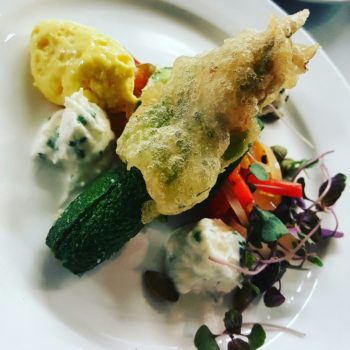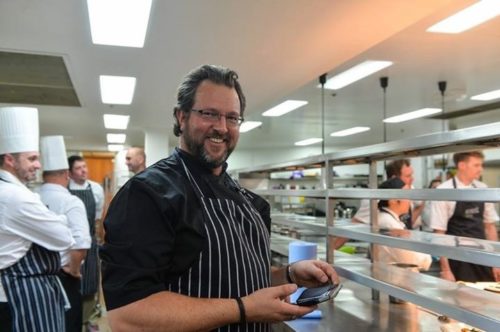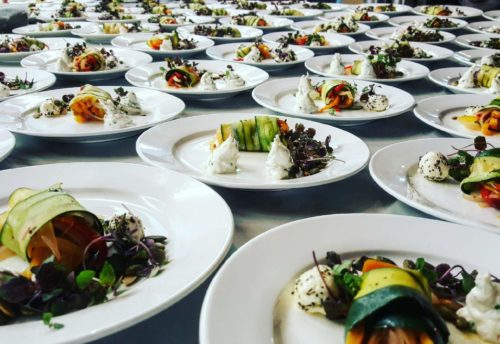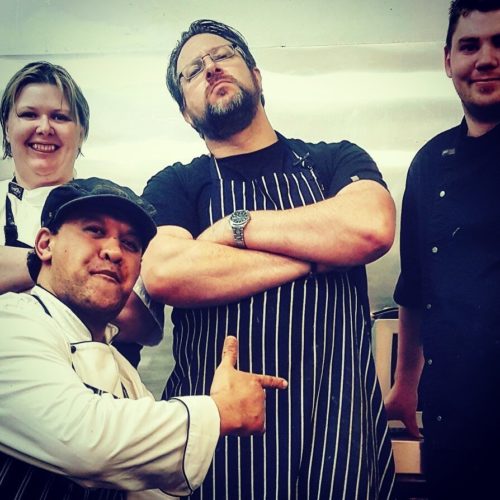“A good service in a restaurant is like a perfect orchestra…”
What makes a career chef? Love and passion always. But grit, guts and good management keep one there. For Paul Foreman, one of Hobart’s best known chefs and caterers, it’s also about the music.
You’d be surprised at his humble beginnings, as I was. A tiny newbie at 13 at KFC, where he was taught systems, safety, hygiene he was sacked, rehired, and began a journey. From W.A. to Hobart at 15, he worked his way around the traps as he finished school.

Tempura
His biggest lessons? On board an abalone boat where he worked cooking and processing from 6am until 10.30pm. I can relate to that – they were my hours in my big restaurant in Brisbane, and burn out was a boomerang. At the moment, his long journey has paused at the offices of the Kalis Group, where his mentor and CEO Alexia, gives him the freedom and power to do what he does best.
The big issues? Profitability, number one. With seven venues to manage and hundreds of staff under his watch, Paul says his bête noir is the $10 meal. No profit in that, it’s a loss leader. And makes it hard for all other small restaurants who don’t have big booze sales or gambling to balance that out.
He’s in accord that menus need to be smaller and more dynamic, and is working towards that. His Black Box Kitchen, a food van he trucks to fairs, just in his spare time, specializes in Pao de Queijo, a delicious Brazilian cheese bread that is versatile, and tasty.
So what’s the deal about music and food? “Well,” he begins, “a perfect service is like a perfect orchestra, which makes the whole so much better than the sum of the parts. It’s music to watch, and experience. Even behind the pass.”
Paul pauses here, and adds for good measure, “But a bad service is like being in prison in the Foreign Legion. You just have to wait until your time’s over!”
“a perfect service is like a perfect orchestra, which makes the whole so much better than the sum of the parts. It’s music to watch, and experience. Even behind the pass.”
What’s the future? Big things. Big. Things. With the thought in mind that consistency is key, Paul’s working on developing a production kitchen that will service all outlets and ensure that customers can be guaranteed the same quality throughout all the venues.
A big departure from the scratch kitchens of yesterday (where everything is made from scratch, just fyi…) Paul also is aware that this type of kitchen will not appeal to all chefs. “Hey, I’m a chef. I cook! I don’t reheat!” That is going to be a hiring issue, getting the right staff into the right jobs.
And Paul also keeps in mind that staff need respect, involvement and responsibility they can step up to, not down. To maintain the standards, he focuses on the head chefs – that way, he has 7 key staff to deal with, and expects the ethos and knowledge to filter down. “It would have killed me, otherwise,” he laughs.
“Do your research, your development, your demographic, and then do something unique. It’s a crowded market out there. So you have to be inventive, but smart about it. And never get too emotional. Talk to people. And listen. They’ll always tell you what you need to know.”
He gives them free reign to a point, but keeps his staff accountable. Sounds like a good system to me. And yes, it’s a brave new and very technological world. Orders, hygiene and stock control systems? Through an iPad. Of course. “Chefs need to know all the pieces of the pie these days, if they want to be management,” he opines. “We’re in a marathon. Sprinters will never last the distance. I guess that’s why I’m still here.”
And what about Front of House? “Well, they can either be a plate carrier or a host. We’re not interested in plate carriers. We’re in hospitality, so every floor person needs to consider themselves a host, first and foremost.” To that end, Scala, a newish RTO is covering the training, outsourcing being an ideal and logical solution to creating a cohesive, smart and clever workforce.
Paul’s heard all the war stories from the past, now he runs a democracy, and is determined that the growth will be solid and relatively pain free. Bridging the divide between the two areas of service – front and back – is a focus. So what’s his main advice?
“The kitchen is the engine room of any food business. You wouldn’t put a 25 horsepower motor in the QE2, now, would you? And it’s still all about the dollars. No profit, no business, and that comes from kitchen and bar if there is one.”
Paul pauses, and sums up his lessons he’s happy to share. “Do your research, your development, your demographic, and then do something unique. It’s a crowded market out there. So you have to be inventive, but smart about it. And never get too emotional. Talk to people. And listen. They’ll always tell you what you need to know.”
And with that, he’s gone! A busy, busy man, with so many balls in the air, that juggling has had to become second nature.
I think about his metaphors: the ships, the music, the orchestra, the Foreign Legion, and marvel at this delicate balancing act that Paul and his staff face every day. Under the watchful eye of Alexia, who happens to have her finger on the pulse of a very big and diverse ship. Long may it sail in calm waters.






1 Comment